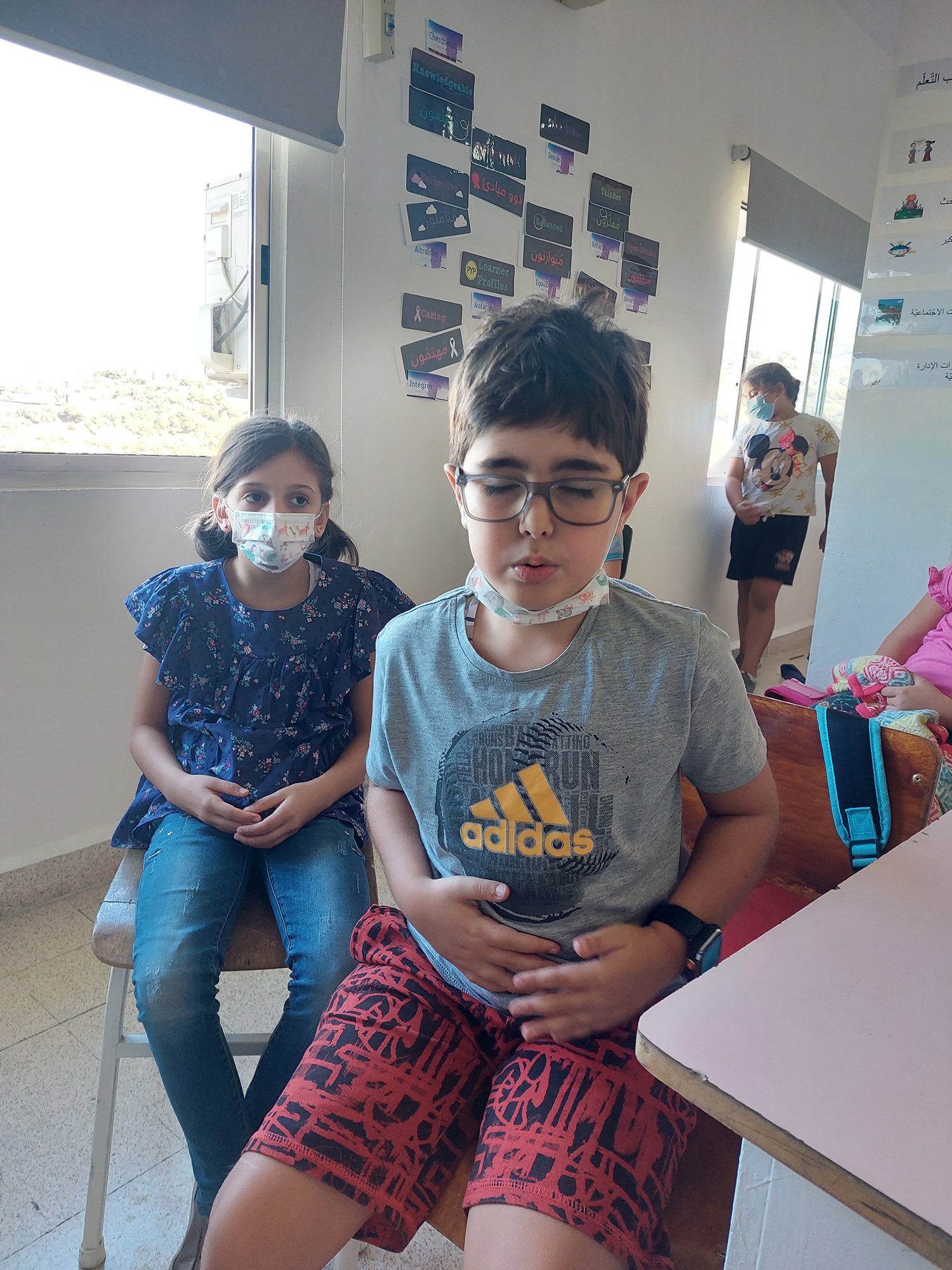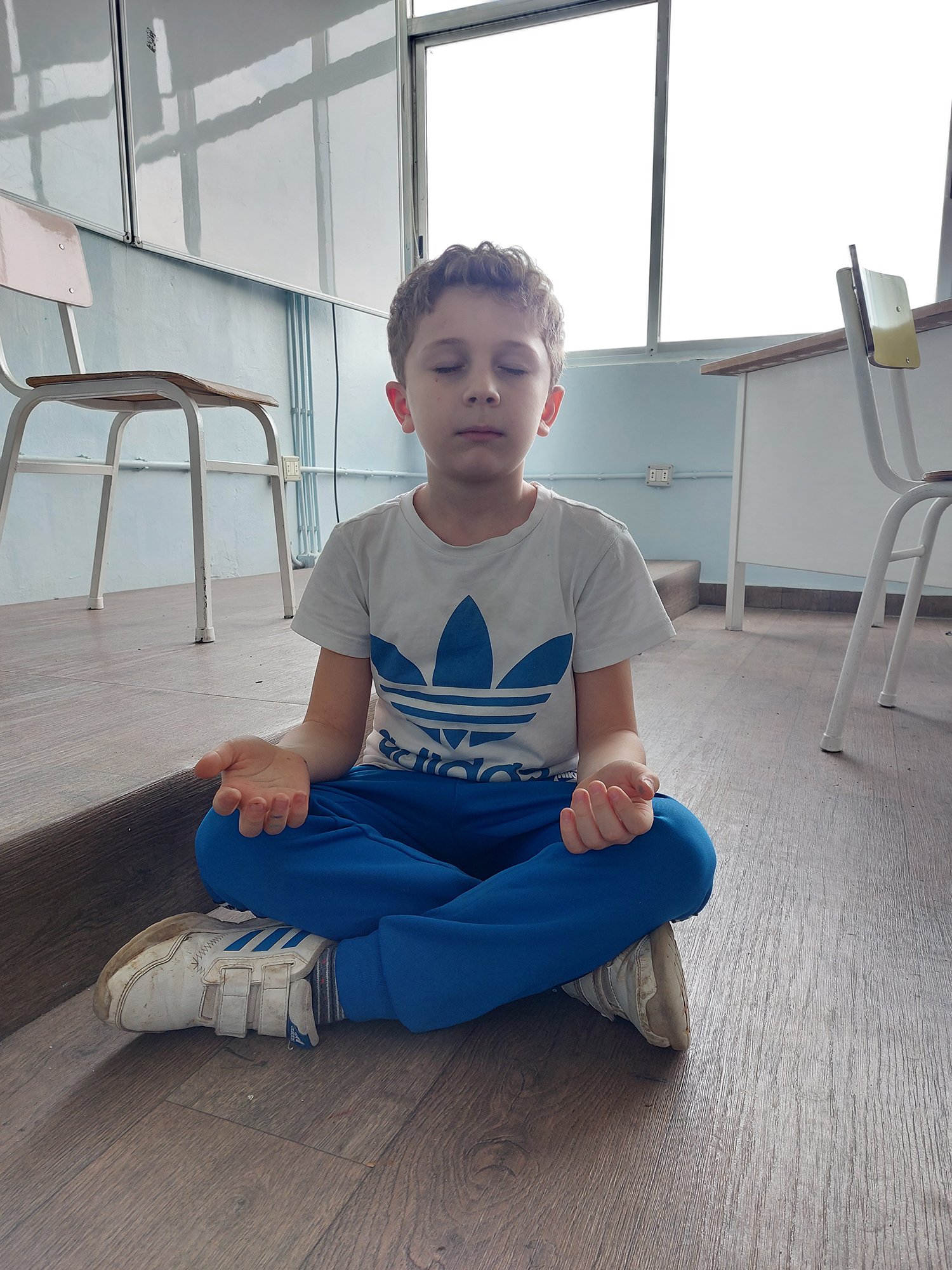
Today’s world places ever-increasing demands on our children’s time and attention.
It is harder and harder to find time to slow down and attend to ourselves, our thoughts, our feelings, our actions—despite how important those moments are for self-management and balance. To ensure we provide children with the time and the skills to manage themselves and their environments and find balance, EIS has made mindfulness courses a part of its program for all students.
About the program.
-
Students at Eastwood learn and engage in mindfulness practices in forty-minute sessions twice a week with a certified mindfulness educator. This mindfulness program for children is designed to help them develop self-awareness, emotional regulation, and stress management skills.
-
Students in mindfulness sessions may be found seated in EIS’s garden or working on mats in the multipurpose room. There, students may engage in relaxation techniques, such as controlled breathing exercises or slow, deliberate movements before getting down to the business of cultivating mindfulness skills and strategies. The mindfulness educator directs students’ attention to the present, providing instruction and guidance on observing a particular sensation of the body or attending to a soothing sound or becoming conscious and aware of a stream of thoughts or feelings.
Once students are firmly engaged in the moment-by-moment experience of the present, students are helped to orient themselves to the thoughts, feelings, or sensations in different ways, deliberately focusing their attention first on one aspect of the experience and then on another. With the support of their mindfulness educator, students practice approaching thoughts and feelings and sensations with curiosity, openness, and without emotional reactivity. Students engaged in these practices are often in silent repose, seated cross-legged or lying down, with their eyes closed.
-
Mindfulness programs target social, emotional, and cognitive skills—skills that a growing corpus of research links to learning and academic achievement. In prefacing their systematic review of studies on the effects of mindfulness programs in schools, Maynard, Solis, Miller, and Brendel of the Campbell Collaboration (2017) note that “numerous social and emotional factors, including emotion regulation, effortful control, social and self-awareness, self-management, relationships skills and decision-making [are] directly and indirectly related to academic performance, school engagement, and externalizing and internalizing behaviors” (p.13). Essentially, students with greater social and emotional skills tend to exercise greater control over their impulses, exhibit stronger concentration and attention, and have greater academic success. And promising research on mindfulness programs in schools is beginning to document how mindfulness practices aid in the development of these skills that are key to student success in school.
COGNITIVE BENEFITS OF MINDFULNESSResearch on mindfulness suggests that its practice and cultivation relies on the development of cognitive processes and functions critical to success in academic, social, and behavioral spheres, specifically attention, self-regulation, executive functioning, and meta-cognition (Maynard et al., 2017).
ATTENTIONA key focus of mindfulness programs is on strengthening control over one’s attention—what to attend to and how long to sustain attention to it. And research shows they are effective. Mindfulness practices have been shown to have a positive impact on improving a variety of dimensions of attention, and some research suggests that mindfulness practices may positively affect the physical structures of the brain responsible for attention (Semple, Droutman, & Reid, 2011; Maynard et al., 2017). A greater ability to control and sustain attention is not only positively associated with successful academic performance, but also with behavior (Maynard et al., 2017).
SELF-REGULATION & EXECUTIVE FUNCTIONINGSelf-regulation and executive functioning are two sets of interrelated skills that allow us to focus our attention, recall directions or instructions, plan courses of action, and manage multiple tasks (“Executive Function and Self-Regulation,” 2019). Self-regulation—the awareness of and control over our emotions, thoughts, and actions—is of particular importance to student success. A student’s self-regulation competencies have been found to be a predictor of student achievement in multiple areas important to their overall success in school, including success in math and reading (Duckworth, 2013; Maynard et al., 2017).
Mindfulness practices require learners to exercise self-regulation in attending to their thoughts as they arise, adopting different perspectives on those thoughts and detaching from emotional reaction to them. Studies suggest that engaging in these practices improves self-regulation and alters the architecture of brain associated with self-regulation (Maynard et al., 2017).
Research suggests that mindfulness practices may improve and enhance learners’ executive functioning skills (Maynard et al., 2017; Teper & Inzlicht, 2013). Executive functioning is a term that refers to the set of skills we use to simultaneously focus on information from multiple sources and alter our planning accordingly. In a joint working paper from the National Scientific Council on the Developing Child and the National Forum on Early Childhood Policy and Programs published by Harvard University (2011), executive functioning is described as foundational to student success in both learning and social interactions. “These skills,” the authors write, “support the process (i.e., the how) of learning—focusing, remembering, planning—that enables children to effectively and efficiently master the content (i.e., the what) of learning—reading, writing, computation. They enable children to acquire knowledge and to participate in the school experience as actively engaged and competent learners” (Center on the Developing Child, 2011, p.4-5).
-
Research also suggests that mindfulness programs can provide a host of psychological, social, and emotional benefits. This is critical for students, as pressure and stress are barriers to learning and success. In their review of empirical studies on the effects of mindfulness, Keng, Smoski, and Robins (2011) found mindfulness to be positively associated with mental health and improved control over behavior. A review of studies of multiple mindfulness programs implemented in schools found that students who practice mindfulness developed greater social and emotional resiliency, were better able to manage stress related to school, and experienced reduced levels of stress overall (Semple, Droutman, & Reid, 2017).
Further, students who engage in mindfulness consistently report themselves to have an improved sense of overall well-being (Keng, Smoksi, & Robins, 2011; Semple, Droutman, & Reid, 2017). Essentially, mindfulness practices result in learners developing the skills to slow down, step back, and better navigate and manage the complexities of life and learning in school.

Mindfulness practices require learners to exercise self-regulation in attending to their thoughts as they arise, adopting different perspectives on those thoughts...
Mindfulness in Education
Internationally and in Lebanon
Educators, schools, school systems, and universities across the globe are beginning to pursue mindfulness programs as a way to support the health and wellbeing of learners and educators in an increasingly busy and stressful world. England and India have implemented large-scale mindfulness programs, and the United States Department of Education has invested $3 million in studying mindfulness in schools in Chicago.
Beyond K-12 institutions, top-ranked universities, including Harvard, Yale, Columbia, and Cambridge, offer regular mindfulness courses to students and the wider community to reduce stress and support wellbeing and success from the inside out. In Lebanon, mindfulness practices and programs are just beginning to develop.
The American University of Beirut offers mindfulness sessions to students and patients and the community, and there are several private centers focused on helping adults becoming more mindful.
But EIS is the only K-12 school to systematically incorporate mindfulness into the education of every child. We believe that helping students develop self-awareness and skills that support their wellbeing must be part of excellence in education in today’s world, where so often the focus falls solely on achievement, often at the expense of student wellbeing. Our mindfulness program for all children is one of the key ways that we aim to fulfill our mission to support the balanced development of the students in our care.
Embrace mindfulness for a brighter future with Eastwood IS
At Eastwood International School, we are committed to nurturing every child and providing them with the tools to thrive in today’s demanding world. Contact us for more information about our mindfulness courses and how they can benefit your children.
Living across the world? Feel free to explore our online options. Join us in creating a balanced, mindful and successful future for our students.
FAQs
-
Our mindfulness program is designed for all students at Eastwood International School, spanning from kindergarten through high school. This comprehensive approach ensures that every student, regardless of age, can benefit from the mindfulness practices tailored to their developmental stage.
-
Mindfulness enhances cognitive processes such as attention, self-regulation, and executive functioning, which are critical for academic success. Students who practice mindfulness exhibit better concentration, impulse control, and overall academic performance.
Educators, schools, school systems, and universities across the
globe are beginning to pursue mindfulness programs
Supporting the health and well-being of learners and educators

Are you looking for a career in teaching?
We are always looking for dedicated educators who are team-oriented and show commitment to student learning. Teachers who share a belief in the school’s mission, and believe they can contribute to our learning environment are encouraged to apply by submitting their CV online. The school will contact those who they believe are a right fit for the available vacancies.







